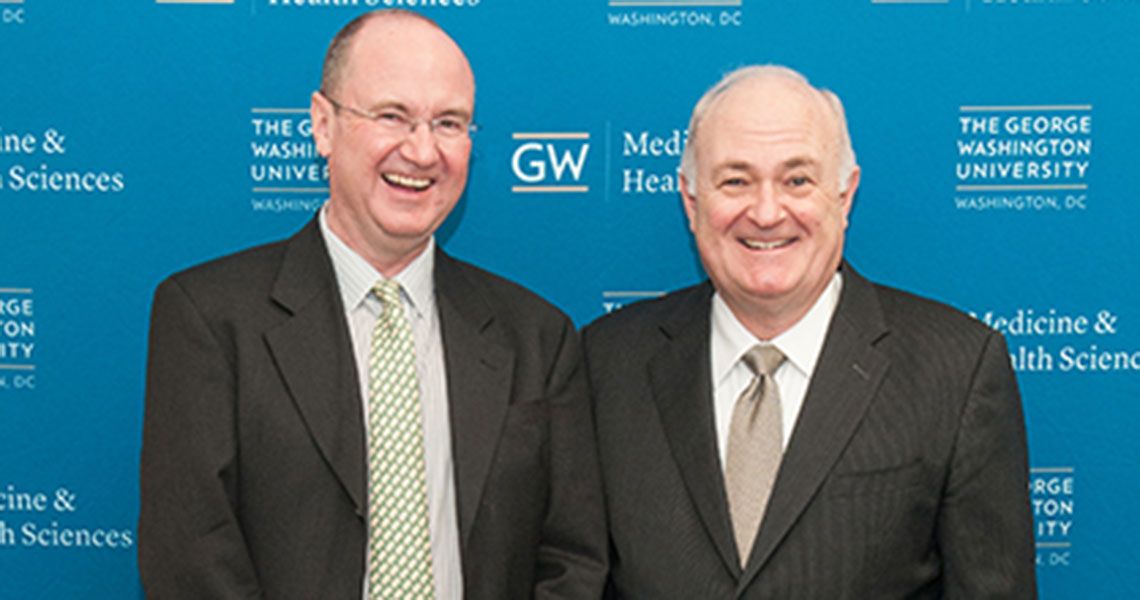In his first six months as a clinical virologist at the University of Oxford, in 1988, Douglas F. Nixon, M.D., Ph.D., identified part of the Human Immunodeficiency Virus (HIV) that could stimulate a white blood cell. It was a substantial finding at the time, and the first of many for Nixon, the renowned HIV/AIDS researcher and educator who was installed as the Walter G. Ross Professor of Basic Science Research at the George Washington University School of Medicine and Health Sciences (SMHS) March 19.
“Dr. Nixon is tackling some of the world’s biggest challenges, and his exceptional work holds real promise of improving the lives of hundreds of millions of people,” said Jeffrey S. Akman, M.D. ’81, RESD ’85, Walter A. Bloedorn Professor of Administrative Medicine, vice president for health affairs, and dean of SMHS, in his opening remarks.
Nixon, who was named chair of the Department of Microbiology, Immunology, and Tropical Medicine at SMHS in October 2013, leads the school’s Research Center for Neglected Diseases of Poverty — housed within 35,000 square feet of newly constructed lab space on the fifth and sixth floors of Ross Hall — and its Center for Basic Research and Prevention of HIV/AIDS. Beyond Foggy Bottom, he also serves as chair of the National Institutes of Health (NIH) AIDS Vaccine Research Subcommittee.
Akman cited Nixon’s enthusiasm and bold, yet collaborative and respectful, leadership style as strengths he brings to his new role. “Dr. Nixon has a profound personal commitment to making a difference in the lives of people here in the District of Columbia, as well as around the world,” said Akman.
Steven Knapp, Ph.D, president of the George Washington University, whose priorities include expanding the scope of the university’s research, expressed delight at the continuation of a tradition of endowed professorships that began nearly 500 years ago. He cited some of Nixon’s academic credentials — bachelor’s degree from the University College of London, medical degree from Westminster Medical School, and master’s and doctoral degrees in immunology from the University of Oxford — as well as his professional accomplishments, which include publishing more than 200 articles in peer-reviewed journals and leading research teams around the world in the effort to develop a cure for HIV/AIDS. Nixon’s work has been recognized by numerous research organizations, such as the National Institutes of Health, the Gates Foundation, and the Elizabeth Glaser Pediatric AIDS Foundation.
Next, Steven Lerman, Ph.D., provost and executive vice president for academic affairs at GW, described the person for whom the professorship is named, Walter G. Ross. Ross, a member of the GW Board of Trustees, fought in the Spanish Civil War, was knighted by Spain, and was involved with the management of the construction of the Panama Canal. “He observed the devastating effects that disease had on the Panamanian population, which inspired his later interest in medical research,” explained Lerman. The professorship, which was created by the Walter G. Ross Foundation in 2006, was designed to support an SMHS faculty member with a significant portfolio in basic science research and interest in translating that research into clinical practice.
Mike McCune, M.D., Ph.D., professor of medicine and chief of the Division of Experimental Medicine at the University of California, San Francisco — where Nixon previously led a lab focused on cellular immune responses to HIV — provided remarks about his friend and colleague of more than 25 years.
“Who is Doug?” McCune asked, rhetorically. “Well, you’re with one of the most outstanding scientists in the field of our time.” In addition to his remarkable contributions to research, “Doug is a wonderful teacher and role model. He has a knack for teaching scientists how to form collaborative, multidisciplinary teams, which is not common amongst biologists.”
McCune quoted some of Nixon’s former colleagues, including one who said that he has “a way of bringing out the best in his lab members, which comes from recruiting people who work well together and creating a climate in which they can do their best work.” McCune also noted the invaluable partnership in scientific research that will now exist between GW and UCSF. “We’re going to put the work together and create something that is greater than the two parts,” he said.
After the professorship was officially conferred by Knapp, Nixon remarked that “it’s actually about all of us, because we’re here to work towards eliminating diseases that are causing suffering in many places around the world.”
Nixon attributed the traits outlined by the afternoon’s speakers to his family members — his father, a physicist; his mother, a judge; and his sister, a musician and linguist. He added a few other details which he suspected his audience was not aware of: he was a bestselling author as a teenager, he has been kidnapped three times, and he has climbed two of China’s sacred mountains.
Nixon said he has enjoyed his time at GW thus far, especially his involvement in a collaboration with students from the university’s interior design program, who are creating timepieces to depict Nixon’s oft-repeated maxim: Time to end HIV. “It’s wonderful to see a congruence of artists and scientists who can inspire each other,” he said.
“No one individual is going to make this breakthrough,” Nixon remarked, in closing. “We all come up with ideas. Ideas are frequent. But actually putting things into practice requires groups to work together and to set common goals. We want to cure AIDS. It’s time to end HIV.”



